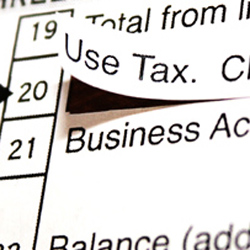
Most Oklahoma Tax Filers Don’t Pay ‘Unenforceable’ Use Tax
-
Joe Wertz
When Oklahomans shop, they’re supposed to pay taxes.
It’s easy in person: Brick-and-mortar retailers collect sales taxes on each purchase. But when Oklahomans order from catalogs and television networks, or click-and-buy online — they owe “use taxes.”
Consumer use taxes in Oklahoma are self-levied. It’s an honor system.
Norm Bekoff of Oklahoma City said he doesn’t bother.
“I think we’re taxed enough as it is,” he told StateImpact Oklahoma in an interview from downtown Oklahoma City.
He’s in good company: About 96 percent of all Oklahoma tax filers.
Oklahoma’s sales and use taxes are similar — on paper.
Items purchased from out-of-state vendors are subject to a 4.5 percent use tax. Like sales taxes, additional county and city taxes may also be levied.
It’s on line No. 20 of the individual income tax return form, where it’s been for five years. The Oklahoma Tax Commission even makes it easy to pay online.
But most Oklahomans aren’t paying use taxes, data from the Oklahoma Tax Commission show.
About 1.6 million individual income tax returns are filed each year, said commission spokeswoman Paula Ross. But over the last five years, only 55,000 taxpayers on average — less than 4 percent — declared use taxes when filing their annual income tax forms with the state, the data show.
“You mean nobody’s volunteering to pay more taxes? I can’t believe that,” Bekoff quipped. “That’s shocking.”
What’s the Use?
Beyond making it easier for taxpayers to pay what they owe, there’s not much the Tax Commission can do, Ross admits.
“It’s definitely a very unenforceable tax, there’s no doubt about that,” she said.
But the Internet is changing everything.
[module align=”right” width=”half” type=”pull-quote”]
“People are somewhat starting to realize that it is their communities that are suffering.”
-Paula Ross, Oklahoma Tax Commission spokeswoman
[/module]
Oklahomans spent more than $2.9 billion online in 2007, according to a University of Tennessee study, and that number is growing.
Using figures from the study, the Tax Commission estimates that Oklahoma is losing $185 million to $225 million in uncollected state and local taxes.
For states to capture future revenues from online transactions, they can’t rely on taxpayers to tax themselves. But making the use tax function like a sales tax is complicated.
Each state has its own laws and tax statutes, which poses a challenge to out-of-state online retailers.
State and local governments want the revenue, and brick-and-mortar retailers say a uniform method for collecting “internet taxes” will close a loophole they say gives their online and out-of-state competition a leg up.
Backed by lawmakers, the State Chamber and other business organizations, Oklahoma’s brick-and-mortar retailers visited Washington, D.C. to put pressure on state congressional delegates — and even President Barack Obama — to adopt the Marketplace Fairness Act, which would make it easier for states to collect taxes for online purchases made by their residents.
A federal bill is the only way for the state to enforce the use tax and to collect the Internet tax in earnest, Ross said.
Use taxes increased in fiscal year 2011, as did the number of taxpayers who remitted the tax on their individual income tax forms, data show. But collections aren’t on a solidly upward trend.
At least not yet, Ross said.
“People are somewhat starting to realize that it is their communities that are suffering because they don’t get the tax, whether it’s the fire, police or roads in their cities.



